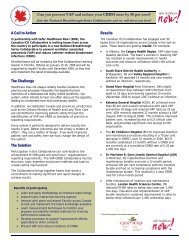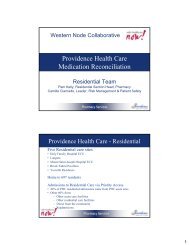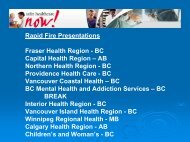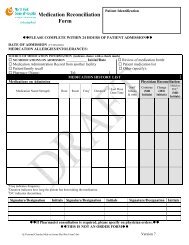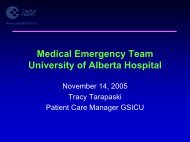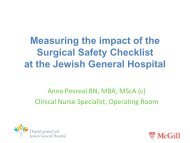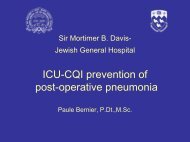Medication Reconciliation in Canada: Raising the Bar (2012) - CIHI
Medication Reconciliation in Canada: Raising the Bar (2012) - CIHI
Medication Reconciliation in Canada: Raising the Bar (2012) - CIHI
- No tags were found...
You also want an ePaper? Increase the reach of your titles
YUMPU automatically turns print PDFs into web optimized ePapers that Google loves.
2011 National SummitFeedback from health care teams across <strong>the</strong> country revealed that while <strong>the</strong>re was a sense ofstrong support for medication reconciliation, <strong>the</strong>re was also frustration at <strong>the</strong> unexpected complexity,<strong>the</strong> need for strong and consistent leadership and sufficient resources to advance this agenda.To address <strong>the</strong>se concerns, <strong>in</strong> February 2011, CPSI, <strong>Canada</strong> Health Infoway and ISMP <strong>Canada</strong>hosted a national <strong>in</strong>vitational summit to accelerate a system-wide strategy to implement medicationreconciliation. Seventy Canadian health care CEOs, senior leaders, representatives from nationalassociations and prov<strong>in</strong>cial quality councils, physicians, nurses and pharmacists worked toge<strong>the</strong>r toidentify <strong>the</strong>mes that would accelerate and optimize medication reconciliation across <strong>the</strong> cont<strong>in</strong>uumof care. As shown <strong>in</strong> Figure 5, <strong>the</strong> key <strong>the</strong>mes identified were leadership support and <strong>in</strong>terprofessionalengagement, <strong>in</strong>clud<strong>in</strong>g physicians.Figure 5 – Key <strong>the</strong>mes identified from <strong>the</strong> February 2011 national medicationreconciliation summit1. Leadership support and accountability2. Inter-professional engagement, <strong>in</strong>clud<strong>in</strong>g <strong>the</strong> role of <strong>the</strong> physician3. Public, consumer and caregiver engagement4. Culture5. Education and tra<strong>in</strong><strong>in</strong>g6. Information systems and technology7. Tools and resources8. Measurement9. ResearchLearn<strong>in</strong>g from Practice LeadersIn an effort to better understand <strong>the</strong> current landscape of medication reconciliation <strong>in</strong> <strong>Canada</strong>,health care organizations that were identified as potential practice leaders were surveyed <strong>in</strong>late 2011. The purpose was to identify challenges and success factors <strong>in</strong> <strong>the</strong> implementation of<strong>the</strong>ir medication reconciliation strategies, and to collect an <strong>in</strong>ventory of tools and resources thatcontributed to <strong>the</strong>ir successes. Figure 6 shows <strong>the</strong> keys to success and <strong>the</strong> challenges identified.<strong>Medication</strong> reconciliation requires engagement of physicians, nurses and pharmacy staff andeffective leadership is critical. The full report, National <strong>Medication</strong> <strong>Reconciliation</strong> Strategy –Identify<strong>in</strong>g Practice Leaders for <strong>Medication</strong> <strong>Reconciliation</strong> <strong>in</strong> <strong>Canada</strong> (CPSI and ISMP <strong>Canada</strong>,<strong>2012</strong>), is available at:• www.saferhealthcarenow.ca/EN/Interventions/medrec/Documents/Identify<strong>in</strong>g%20Practice%20Leaders%20for%20<strong>Medication</strong>%20<strong>Reconciliation</strong>%20<strong>in</strong>%20<strong>Canada</strong>.pdf• www.ismp-canada.org/download/MedRec/Identify<strong>in</strong>g_Practice_Leaders_for_<strong>Medication</strong>_<strong>Reconciliation</strong>_<strong>in</strong>_<strong>Canada</strong>.pdf.12 <strong>Medication</strong> <strong>Reconciliation</strong> <strong>in</strong> <strong>Canada</strong>: Rais<strong>in</strong>g <strong>the</strong> <strong>Bar</strong>



